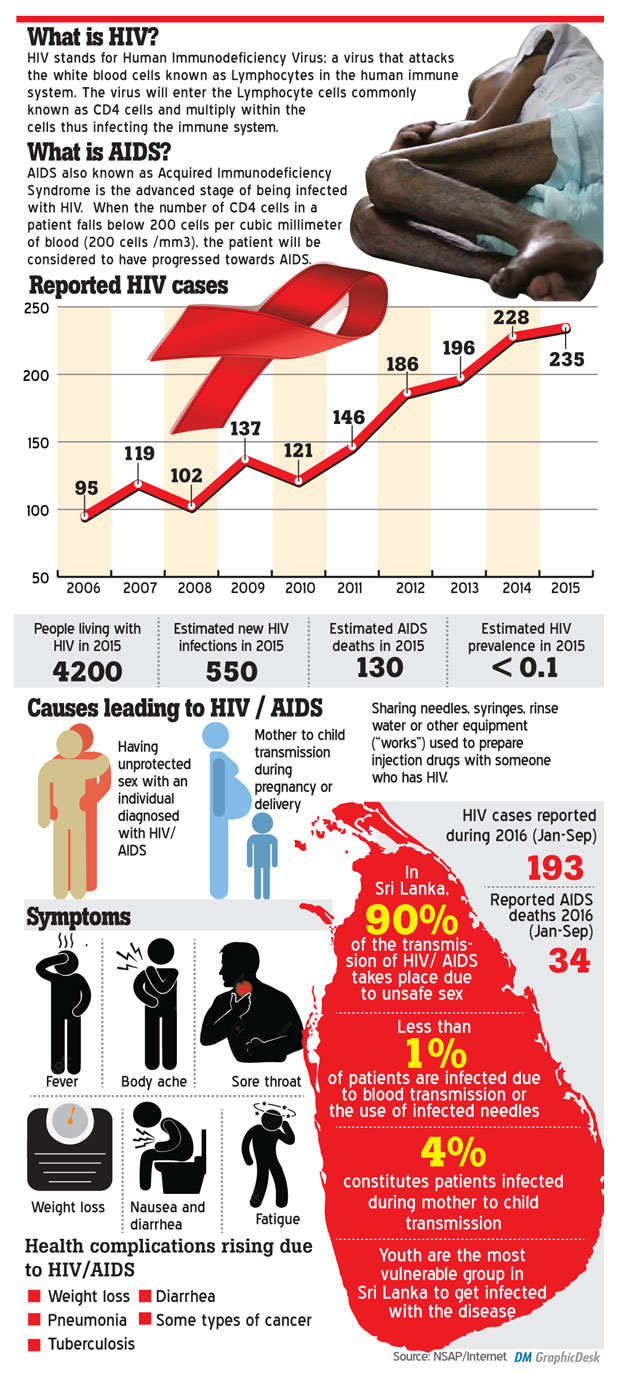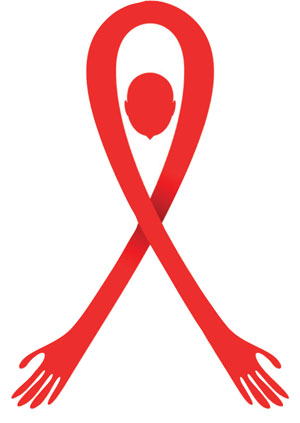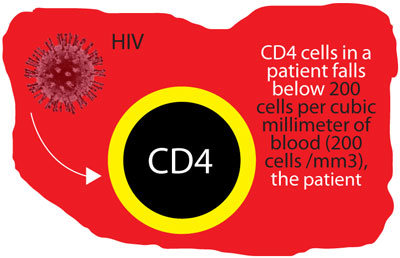Reply To:
Name - Reply Comment


By Sarah Muiz
As we mark World AIDS Day today, let’s take a moment to reflect upon the various health implications concerning the subject of HIV/AIDS. As a disease that could deteriorate and ruin people’s health, the need to raise ample awareness on HIV/AIDs appears to be the need of the hour. Therefore, reinforcing the message that ‘Prevention is better than cure’ is crucial against contracting the disease. Speaking to Daily Mirror, Director of National STD/AIDS Control Programme, Sri Lanka, Dr. Sisira Liyanage explicated how HIV/AIDS could ruin the health of an individual while giving a deep insight into how the disease could attack the immune system of a healthy individual. Current statistics at the National STD/AIDS Control Programme indicate that people living with HIV in 2015 was estimated at 4100 with the prevalence rate for HIV in the 15-49 age group being less than 0.1% at the end of 2014.
 According to Dr. Liyanage, the HIV virus enters the body and attacks the white blood cells known as Lymphocytes, thereby destroying the human immune system. “The virus enters the Lymphocytes known as CD4 cells and multiplies within these cells, while effecting other similar cells in the body. When the multiplication indicates an abnormal increase, the CD4 cell count will gradually decrease. When the number of CD4 cells in a patient falls below 200 cells per cubic millimeter of blood (200 cells /mm3), the patient will be considered to have progressed towards AIDS. When CD4 cells are destroyed, it can provide support for an effective immune system” he said.
According to Dr. Liyanage, the HIV virus enters the body and attacks the white blood cells known as Lymphocytes, thereby destroying the human immune system. “The virus enters the Lymphocytes known as CD4 cells and multiplies within these cells, while effecting other similar cells in the body. When the multiplication indicates an abnormal increase, the CD4 cell count will gradually decrease. When the number of CD4 cells in a patient falls below 200 cells per cubic millimeter of blood (200 cells /mm3), the patient will be considered to have progressed towards AIDS. When CD4 cells are destroyed, it can provide support for an effective immune system” he said.
There are three modes of HIV/AIDS transmission. He pointed out that the first method of transmission could take place during unsafe sexual intercourse. “This is very unsafe due to the concentration of the HIV virus in the body of the infected person. Secondly, a person can contract the disease when sharing infected needles and blood transfusions. Many people nowadays tend to inject heroin into their veins and if such people share the same needles, the disease can be transmitted from one person to another, especially when the infected needles are unsterilized. Thirdly, HIV/AIDS could be transmitted from mother to child during pregnancy or delivery. During pregnancy, if the mother is infected with HIV, the virus can be transmitted to the fetus through a placental transmission. The disease could be transmitted to the child through breast milk as well” Dr. Liyanage added.
However, he said that in Sri Lanka, the main mode of transmitting HIV/AIDS takes place through unsafe sex. 90% of the disease transmission takes place due to unsafe sex, while less than 1% is due to blood transmission using unsterilized needles and 4% of the disease transmission takes place from mother to child. He also added that there could be other health implications following the development of HIV to an advanced stage of AIDS. Due to the lack of a strong immune system, such patients would be vulnerable to other health complications such as pneumonia, certain types of cancer, tuberculosis, diarrhea and weight loss.
When a person contracts the HIV virus, he or she may develop the symptoms of viral fever during the first three to six weeks. On the other hand, such symptoms may not appear in some patients who have contracted the disease. “As part of the diagnoses process, if an individual has had unsafe sex followed by a mild fever, it would be advisable for them to conduct a HIV test to verify their health condition. The only way to identify a patient is to conduct a HIV diagnosis test. If not, it would be difficult to identify such patients. Besides, it should also be noted that complications such as pneumonia and tuberculosis are indicative of the secondary symptoms related to AIDS.
HIV and AIDS cannot be totally eradicated from the body but can be controlled with treatment. Even at the late stage of developing AIDS, we can provide the patient with antiretroviral treatment for HIV; to control the disease and prevent it from worsening. Since the HIV virus links with the cells in our DNA, it is very difficult to cure the disease completely. However, through constant treatment it is always possible to reduce the multiplication of the HIV virus in CD4 cells. With the proper antiretroviral treatment taken under medical advice, an HIV patient has a chance of leading a normal life. The youth who represent the young adults in society are very much vulnerable to HIV/AIDS. In most cases, they lack awareness and don’t take necessary precautions he said.
Precautions against contracting the disease
Stating that the main mode of transmission in Sri Lanka is recognized as unsafe sex, Dr. Liyanage said it was important to reduce such risky behaviour. “It is always advisable to have a single partner throughout life and to use a condom in order to minimize the risk of contracting HIV/AIDS. It is also very important to raise ample awareness while reducing the stigma and discrimination attached to it. If not, such patients will feel reluctant to seek medical advice and treatment from us” he added.